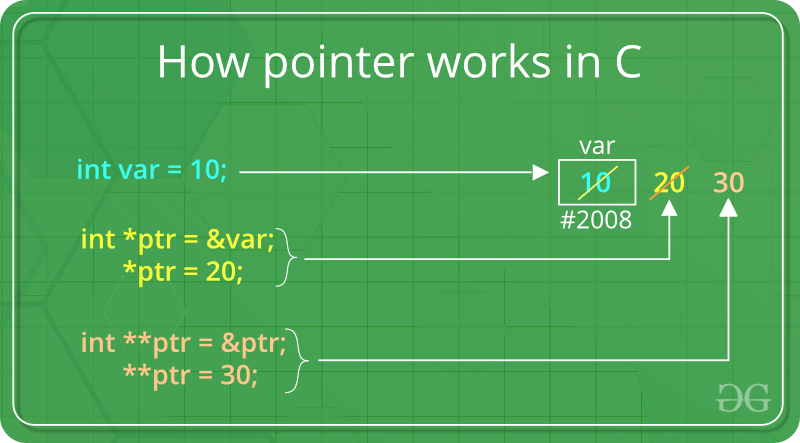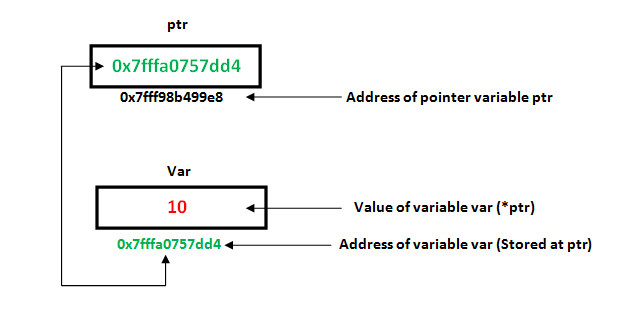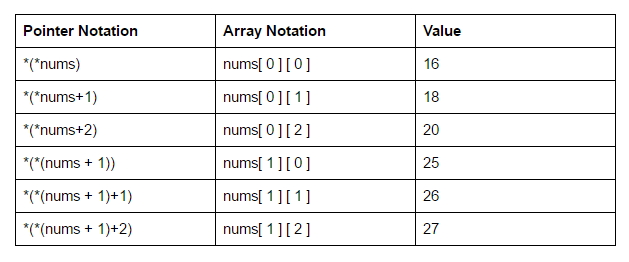Pointers in C/C++ with Examples
What are Pointers?
In C++, a pointer refers to a variable that holds the address of another variable. Like regular variables, pointers have a data type. For example, a pointer of type integer can hold the address of a variable of type integer. A pointer of character type can hold the address of a variable of character type.
You should see a pointer as a symbolic representation of a memory address. With pointers, programs can simulate call-by-reference. They can also create and manipulate dynamic data structures. In C++, a pointer variable refers to a variable pointing to a specific address in a memory pointed by another variable.
Addresses in C++
To understand C++ pointers, you must understand how computers store data.
When you create a variable in your C++ program, it is assigned some space the computer memory. The value of this variable is stored in the assigned location.
To know the location in the computer memory where the data is stored, C++ provides the & (reference) operator. The operator returns the address that a variable occupies.
For example, if x is a variable, &x returns the address of the variable.
Pointer Declaration Syntax
The declaration of C++ takes the following syntax:
1
datatype *veriable_name;
- The datatype is the base type of the pointer which must be a valid C++ data type.
- The variable_name is should be the name of the pointer variable.
- Asterisk used above for pointer declaration is similar to asterisk used to perform multiplication operation. It is the asterisk that marks the variable as a pointer.
Here is an example of valid pointer declarations in C++:
1
2
3
4
int *x; // a pointer to integer
double *x; // a pointer to double
float *x; // a pointer to float
char *ch // a pointer to a character
Reference operator (&) and Deference operator (*)
The reference operator (&) returns the variable’s address.
The dereference operator (*) helps us get the value that has been stored in a memory address.
For example:
If we have a variable given the name num, stored in the address 0x234 and storing the value 28.
The reference operator (&) will return 0x234.
The dereference operator (*) will return 5.
How to use a pointer?
- Define a pointer variable
- Assigning the address of a variable to a pointer using unary operator (&) which returns the address of that variable.
- Accessing the value stored in the address using unary operator (*) which returns the value of the variable located at the address specified by its operand.
The reason we associate data type to a pointer is that it knows how many bytes the data is stored in. When we increment a pointer, we increase the pointer by the size of data type to which it points.
1
2
3
4
5
6
7
8
9
10
11
12
13
14
15
16
17
18
19
20
21
22
23
24
// C program to illustrate Pointers in C
#include <stdio.h>
void pointer_test()
{
int var = 20;
// declare pointer variable
int *ptr;
// note that data type of ptr and var must be same
ptr = &var;
// assign the address of a variable to a pointer
printf("Value at ptr = %p \n",ptr);
printf("Value at var = %d \n",var);
printf("Value at *ptr = %d \n", *ptr);
}
// Driver program
int main()
{
pointer_test();
}
Output:
1
2
3
Value at ptr = 0x7ffcb9e9ea4c
Value at var = 20
Value at *ptr = 20
References and Pointers
There are 3 ways to pass C++ arguments to a function:
- call-by-value
- call-by-reference with pointer argument
- call-by-reference with reference argument
1
2
3
4
5
6
7
8
9
10
11
12
13
14
15
16
17
18
19
20
21
22
23
24
25
26
27
28
29
30
31
32
33
34
35
36
37
38
39
40
41
42
43
44
45
46
47
48
49
50
51
52
53
54
55
56
57
58
59
60
61
// C++ program to illustrate call-by-methods in C++
#include <bits/stdc++.h>
using namespace std;
//Pass-by-Value
int square1(int n)
{
//Address of n in square1() is not the same as n1 in main()
cout << "address of n1 in square1(): " << &n << "\n";
// clone modified inside the function
n *= n;
return n;
}
//Pass-by-Reference with Pointer Arguments
void square2(int *n)
{
//Address of n in square2() is the same as n2 in main()
cout << "address of n2 in square2(): " << n << "\n";
// Explicit de-referencing to get the value pointed-to
*n *= *n;
}
//Pass-by-Reference with Reference Arguments
void square3(int &n)
{
//Address of n in square3() is the same as n3 in main()
cout << "address of n3 in square3(): " << &n << "\n";
// Implicit de-referencing (without '*')
n *= n;
}
void geeks()
{
//Call-by-Value
int n1=8;
cout << "address of n1 in main(): " << &n1 << "\n";
cout << "Square of n1: " << square1(n1) << "\n";
cout << "No change in n1: " << n1 << "\n";
//Call-by-Reference with Pointer Arguments
int n2=8;
cout << "address of n2 in main(): " << &n2 << "\n";
square2(&n2);
cout << "Square of n2: " << n2 << "\n";
cout << "Change reflected in n2: " << n2 << "\n";
//Call-by-Reference with Reference Arguments
int n3=8;
cout << "address of n3 in main(): " << &n3 << "\n";
square3(n3);
cout << "Square of n3: " << n3 << "\n";
cout << "Change reflected in n3: " << n3 << "\n";
}
//Driver program
int main()
{
geeks();
}
Output:
1
2
3
4
5
6
7
8
9
10
11
12
address of n1 in main(): 0x7ffcdb2b4a44
address of n1 in square1(): 0x7ffcdb2b4a2c
Square of n1: 64
No change in n1: 8
address of n2 in main(): 0x7ffcdb2b4a48
address of n2 in square2(): 0x7ffcdb2b4a48
Square of n2: 64
Change reflected in n2: 64
address of n3 in main(): 0x7ffcdb2b4a4c
address of n3 in square3(): 0x7ffcdb2b4a4c
Square of n3: 64
Change reflected in n3: 64
In C++, by default arguments are passed by value and the changes made in the called function will not reflect in the passed variable. The changes are made into a clone made by the called function. If wish to modify the original copy directly (especially in passing huge object or array) and/or avoid the overhead of cloning, we use pass-by-reference. Pass-by-Reference with Reference Arguments does not require any clumsy syntax for referencing and dereferencing.
Array Name as Pointers
An array name contains the address of first element of the array which acts like constant pointer. It means, the address stored in array name can’t be changed. For example, if we have an array named val then val and &val[0] can be used interchangeably.
1
2
3
4
5
6
7
8
9
10
11
12
13
14
15
16
17
18
19
20
21
22
// C program to illustrate call-by-methods
#include <stdio.h>
void geeks()
{
//Declare an array
int val[3] = { 5, 10, 20 };
//declare pointer variable
int *ptr;
//Assign the address of val[0] to ptr
// We can use ptr=&val[0];(both are same)
ptr = val ;
printf("Elements of the array are: ");
printf("%d %d %d", ptr[0], ptr[1], ptr[2]);
}
//Driver program
int main()
{
geeks();
}
Output:
1
Elements of the array are: 5 10 20
If pointer ptr is sent to a function as an argument, the array val can be accessed in a similar fashion.
Pointer Expressions and Pointer Arithmetic
A limited set of arithmetic operations can be performed on pointers which are:
- incremented ( ++ )
- decremented ( — )
- an integer may be added to a pointer ( + or += )
- an integer may be subtracted from a pointer ( – or -= )
- difference between two pointers (p1-p2)
1
2
3
4
5
6
7
8
9
10
11
12
13
14
15
16
17
18
19
20
21
22
23
24
25
26
27
28
29
// C++ program to illustrate Pointer Arithmetic in C++
#include <bits/stdc++.h>
using namespace std;
void geeks()
{
//Declare an array
int v[3] = {10, 100, 200};
//declare pointer variable
int *ptr;
//Assign the address of v[0] to ptr
ptr = v;
for (int i = 0; i < 3; i++)
{
cout << "Value at ptr = " << ptr << "\n";
cout << "Value at *ptr = " << *ptr << "\n";
// Increment pointer ptr by 1
ptr++;
}
}
//Driver program
int main()
{
geeks();
}
Output:
1
2
3
4
5
6
Value at ptr = 0x7fff9a9e7920
Value at *ptr = 10
Value at ptr = 0x7fff9a9e7924
Value at *ptr = 100
Value at ptr = 0x7fff9a9e7928
Value at *ptr = 200
Advanced Pointer Notation
Consider pointer notation for the two-dimensional numeric arrays. consider the following declaration
1
int nums[2][3] = { { 16, 18, 20 }, { 25, 26, 27 } };
In general, nums[ i ][ j ] is equivalent to ((nums+i)+j)
Pointers and String literals
String literals are arrays containing null-terminated character sequences. String literals are arrays of type character plus terminating null-character, with each of the elements being of type const char (as characters of string can’t be modified).
1
const char * ptr = "geek";
This declares an array with the literal representation for “geek”, and then a pointer to its first element is assigned to ptr. If we imagine that “geek” is stored at the memory locations that start at address 1800, we can represent the previous declaration as:
As pointers and arrays behave in the same way in expressions, ptr can be used to access the characters of string literal. For example:
1
2
char x = *(ptr+3);
char y = ptr[3];
Here, both x and y contain k stored at 1803 (1800+3).
Pointers to pointers
In C++, we can create a pointer to a pointer that in turn may point to data or other pointer. The syntax simply requires the unary operator (*) for each level of indirection while declaring the pointer.
1
2
3
4
5
6
char a;
char *b;
char ** c;
a = ’g’;
b = &a;
c = &b;
Here b points to a char that stores ‘g’ and c points to the pointer b.
Void Pointers
This is a special type of pointer available in C++ which represents absence of type. void pointers are pointers that point to a value that has no type (and thus also an undetermined length and undetermined dereferencing properties). This means that void pointers have great flexibility as it can point to any data type. There is payoff for this flexibility. These pointers cannot be directly dereferenced. They have to be first transformed into some other pointer type that points to a concrete data type before being dereferenced.
1
2
3
4
5
6
7
8
9
10
11
12
13
14
15
16
17
18
19
20
21
22
23
24
25
26
27
28
29
30
31
32
33
34
35
36
37
38
39
40
41
42
43
44
45
46
47
48
// C++ program to illustrate Void Pointer in C++
#include <bits/stdc++.h>
using namespace std;
void increase(void *data,int ptrsize)
{
if(ptrsize == sizeof(char))
{
char *ptrchar;
//Typecast data to a char pointer
ptrchar = (char*)data;
//Increase the char stored at *ptrchar by 1
(*ptrchar)++;
cout << "*data points to a char"<<"\n";
}
else if(ptrsize == sizeof(int))
{
int *ptrint;
//Typecast data to a int pointer
ptrint = (int*)data;
//Increase the int stored at *ptrchar by 1
(*ptrint)++;
cout << "*data points to an int"<<"\n";
}
}
void geek()
{
// Declare a character
char c='x';
// Declare an integer
int i=10;
//Call increase function using a char and int address respectively
increase(&c,sizeof(c));
cout << "The new value of c is: " << c <<"\n";
increase(&i,sizeof(i));
cout << "The new value of i is: " << i <<"\n";
}
//Driver program
int main()
{
geek();
}
Output:
1
2
3
4
*data points to a char
The new value of c is: y
*data points to an int
The new value of i is: 11
Invalid pointers
A pointer should point to a valid address but not necessarily to valid elements (like for arrays). These are called invalid pointers. Uninitialized pointers are also invalid pointers.
1
2
3
int *ptr1;
int arr[10];
int *ptr2 = arr+20;
Here, ptr1 is uninitialized so it becomes an invalid pointer and ptr2 is out of bounds of arr so it also becomes an invalid pointer. (Note: invalid pointers do not necessarily raise compile errors)
NULL Pointers
Null pointer is a pointer which point nowhere and not just an invalid address. Following are 2 methods to assign a pointer as NULL;
1
2
int *ptr1 = 0;
int *ptr2 = NULL;






